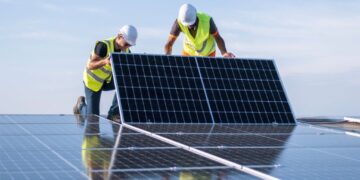Ayobami Adedinni
The Renewable Energy Association of Nigeria(REAN) has said the group is committed in its efforts in ensuring a robust renewable energy sector.
REAN is the umbrella body of Renewable energy companies in Nigeria.
Speaking with PetrolGasReport, Lande Abudu, Executive Secretary said the activity within the sector has increased its awareness.
She said, “We are unrelenting in our efforts to build a robust renewable energy sector and this comprises numerous activities such as spearheading efforts to ensure favourable, business-friendly policies for the sector and proper implementation of the same.
” Within a multi-stakeholder group including REAN members, renewable energy experts, public sector stakeholders and regulators, other associations, developers and more, we are engaging with the wider power sector to encourage sustainable growth for what is essentially an evolving sector.
“While this is very much a work-in-progress, we are making strides. Increased activity within the sector has increased the visibility and the conversation has reached a wider audience.
” With the increased awareness, comes an understanding of the need to put our collective efforts into ensuring that the sector works effectively, supports the players within it and that there is a good foundation for long term sustainability.
” Our common aim, we must not forget, is to give Nigerians access to clean, reliable and affordable access to power. These activities are meant to make it happen,” she stated.
Speaking further, she said the regulatory environment should encourage increased investment into the sector.
” The regulatory bodies have to be open to listening to the industry players.
“The Industry operators can operate optimally where regulation is fit for purpose but not so stringent as to stifle the very industry that they are trying to regulate.
” The regulatory environment should give comfort to those committed to working in the RE space, thereby encouraging their growth for the benefit of the Nigerian economy. Investor confidence will naturally follow, thereby increasing investment into the sector.
“Industry players on their part need to be disciplined and to run businesses with transparent processes. Quality Assurance in line with global best practices is the primary goal. We cannot allow sub-standard goods to flood the country and we cannot compromise on robust standardisation within the industry.
“It’s a natural synergy. It must be a symbiotic relationship,” she said.
Speaking on funding available for entrepreneurs in the sector, she said, ” the conventional financial instruments might not necessarily offer the right solutions for entrepreneurs in the renewable energy sector.
“That said, the conversation is gaining traction on how best to achieve green financing.
“Funding from various sources has thus far been the means by which REAN, with many other stakeholders are working together to find a lasting solution for the sustainability of the sector.
“We remain optimistic that with the concerted effort going into finding workable solutions, the light at the end of the tunnel does not seem so far away,” she added.
According to her, accelerating gender inclusion overall and specifically in the energy sector should be given priority.
In her words,” Cultural sensitivities among other factors have kept females away from the energy sector.
” Some of this comes from being discouraged in STEM education from an early age. The ability is there but there are few role models for girls. REAN is a founding member of the Women in Renewable Energy Roundtable with a focus to increasing gender and social inclusion with specific accelerator activities.
“We participate in the Women Leadership Group to collaborate on various programmes that will see us actualise gender equality, incidentally SDG #5.These activities re designed to tackle the different roadblocks that stop 51 per cent of the population from achieving their full potential and fully contributing their quota into the system.
“Some of them include schools programmes to encourage girls into STEM education, tertiary institution drives to demystify STEM degrees and numerous workshops, capacity building opportunities and networking sessions.
“It’s a simple premise – we cannot ignore the potential contribution of half of the population,” she added.























